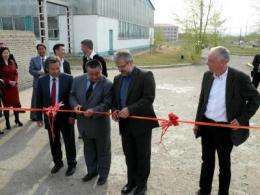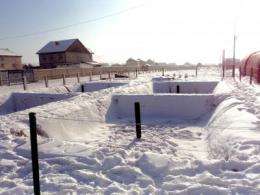The first pilot wastewater treatment plant with integrated wood production opened in Mongolia

Long winters with low temperatures of -40°C and extended hot and dry periods with sand storms are significant challenges for people and infrastructure in Mongolia. Funded by the German Ministry of Education and Research (BMBF) the MoMo - project (Integrated Water Resource Management in Central Asia: Model region Mongolia (MoMo) is focused on identifying appropriate water management solutions to the vast and sparsely populated and resource rich nation.
One task of the researchers is to identify an integrated concept for decentralised wastewater treatment and to test it in local Mongolian conditions. Last week the decentralised wastewater pilot plant with integrated wood production was commissioned and handed over to the Mongolian University of Technology in Darkhan. The innovative concept was developed with the cooperation of Mongolian and German partners in order to contribute in solving the following three problems that face Mongolia: the lack of appropriate sanitation; increasing water scarcity and deforestation caused by a high demand of heating materials.
Yurts, yaks and Chingis Khaan, these are the fist things that come to mind when you think of Mongolia. This vast country with the lowest population density world wide is a land of contrasts. Since political change in the 1990's a third of the population have lived in poverty. Recently, mining activities have lead to an increase in economic growth. This increased wealth can be seen in the urban centres while significant poverty issues persist in the fast growing suburbs as traditional herders choose to migrate to move away from their traditional lifestyle.
This dynamic change in population pattern is a challenge to infrastructure delivery including appropriate sanitation in the urban and peri-urban areas. Meanwhile the poor status of the existing sanitation systems represents serious risks for environmental and human health.

Professor Dietrich Borchardt (MoMo-project leader, UFZ) and Prof Dorlingsuren Lkhanag, the director of the MUST University opened a research pilot plant which is a component of the second phase of the MoMo research project. The project involves researchers, private organisations and Ministerial Departments from Mongolia and Germany to develop an integrated water resources management concept for the Kharaa basin.
The basin lies in the north of Mongolia and incorporates the city of Darkhan which has a very low annual level of precipitation of 280 mm. Continued logging and grazing pressure is leading to increased deforestation in the region. Willow stands along the Kharaa river floodplain have been heavily impacted, which has lead to the loss of important ecological services.
The harsh Mongolian climate provides several significant challenges to drinking and wastewater infrastructure with pipework required to be between 3.5 and 4.5 m below surface in order to avoid freezing. In addition, the biological treatment step common too many conventional wastewater treatment plants require heating or additional housing. This leads to significant cost increases, which are often unaffordable in Mongolia.
This combination of environmental, social and demographic conditions together with old and unreliable infrastructures represents a large challenge for the development of appropriate wastewater treatment technologies.
The proposed solution of the research group from Leipzig is to pre-treat wastewater for irrigating and the production of willow trees. The irrigation of such rotating coppice is an integral part of the treatment process while also providing an important resource. There are large amounts of available space in Mongolia which can be used for the treatment of wastewater from suburbs or small settlements. The research program focuses on water quality requirements for sustainable irrigation which considers risks associated with groundwater and soil contamination. The research also considers the extreme climatic conditions such as the storage of the irrigation water and the operation of the plant during winter.
Results of the research work in Mongolia will contribute to optimising the system and identifying its feasibility as an important component of an IWRM at a wider regional scale.
Provided by Helmholtz Association of German Research Centres



















